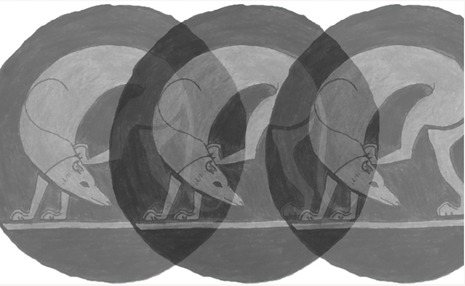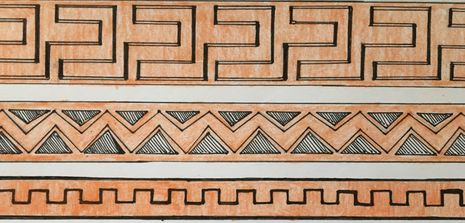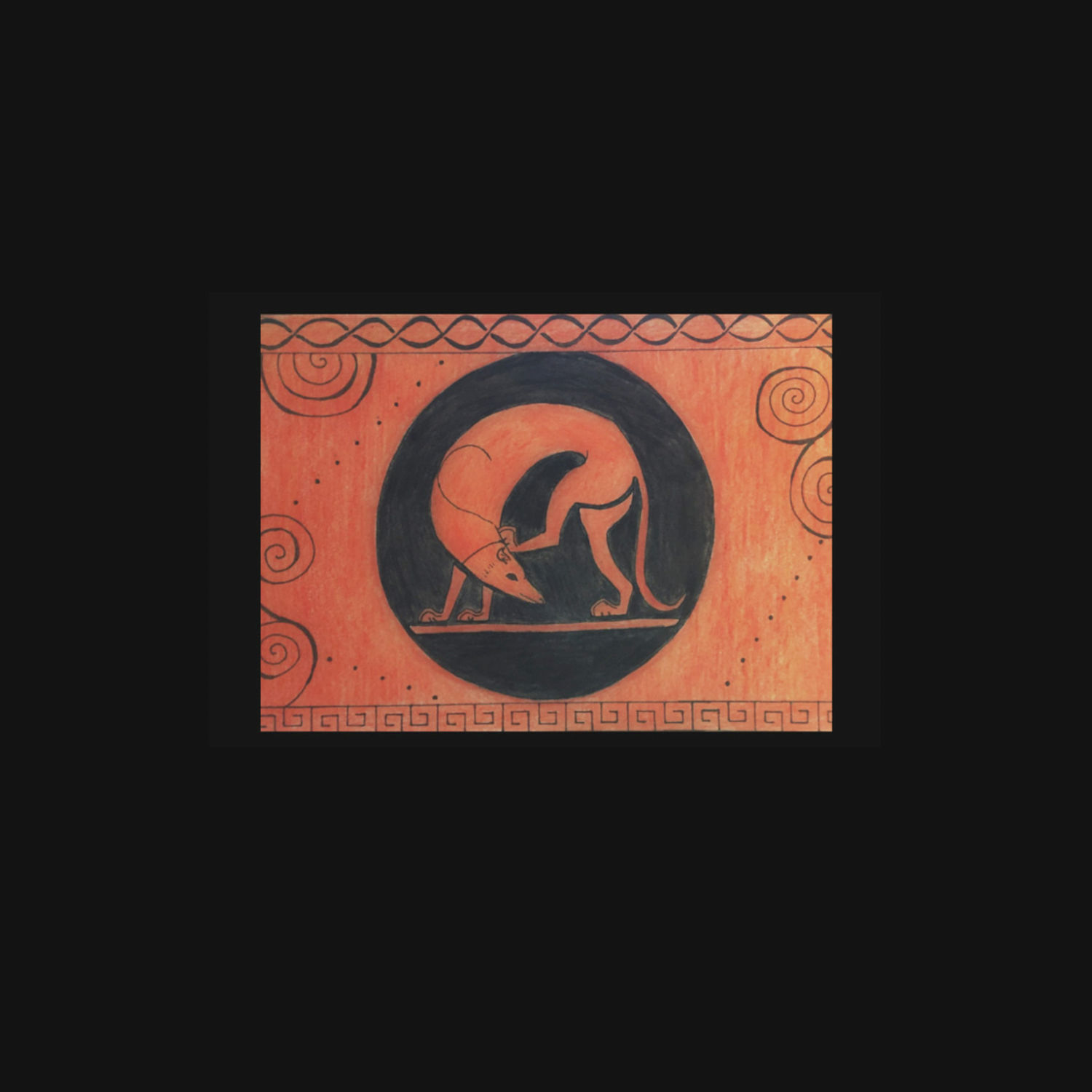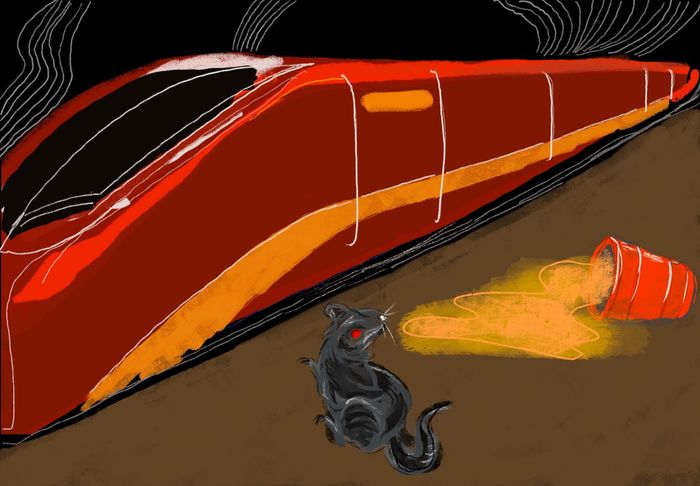It was a lank-limbed dog, a lurching, drooling creature with eyes jutting out of its skull at odd angles. Whichever god had shaped it had thrown its pieces together at random, unthinkingly. A mongrel, hodgepodge creature, possessed of a cunning no purebred could lay claim to. It stole food from the tents when the men were off fighting, then came and blinked at them with huge, globular eyes until they were forced to forgive it.
No one knew where it had come from. Certainly not from home, for no man would bring his dog across the seas to war. Some thought it was a Trojan creature, who had slunk away from the great city and into their camp. They called it an auspicious sign. See, see, they said, how even the dogs of Troy abandon their masters for us. The soldiers laughed and joked about it, reassuring themselves that they, too, had chosen the winning side.
At first the dog wandered aimlessly among them, for the camp stretched the whole length of the beach and there seemed to be endless scraps to scrounge, endless hands to scratch its ears or rub its belly. It passed among the tents of the Myrmidons, the Ithacans, the Mycenaeans, unaware that every day brought it among men of a new nation. The enormity of this achievement, this gathering of the forces of so many Greek kings, all united, all turned towards a common enemy, was entirely lost on the dog.
After a time, the creature arrived among the tents of the army from Tricca, a little city-state of Thessaly. There, the dog found its home, for the first thing that it saw, the first thing that it smelt, was Prince Machaon emerging from a tent. The surgeon prince, come from tending to the wounds of injured men. There were spots of blood on his hands and face. At once, the dog knew that it had found a friend.
“The enormity of this achievement, this gathering of the forces of so many Greek kings, all united, all turned towards a common enemy, was entirely lost on the dog”
From that day onward, the dog tailed Machaon, the image of loyalty as long as it could sniff and lick at his hands. When he was tending to his patients the creature stood sentinel at the bedside. It could sense when the treatment went poorly, would bow its head and whine. If the injured man could reach out a hand and stroke the creature’s head, Machaon would nod and give a little satisfied grunt. A good sign.
As the dog became a common sight around their captain, Machaon’s soldiers took to calling it Nikon and would raise a weak cheer whenever it went bounding by. Podalirius, Tricca’s other prince, dined with Machaon every evening and, after the dog’s arrival, noticed a marked improvement in his brother’s mood. This amounted to an occasional smile, which was a rarity from him. Machaon even called him ‘Pod’ as he was getting up to leave. That was a name he hadn’t used since they were boys, playing pretend in their father’s garden. Playing soldiers and fighting whole armies between the two of them. It made Podalirius smile to hear him say it.
So when the dog disappeared, Podalirius noticed. He was working in the medicine tent, stitching a wound closed, when he glanced up and saw Machaon labouring alone at an amputation, no hound at his side. Podalirius frowned to himself, returned to his labours, but when the work was finished he went and found his brother.
“Where’s Nikon?”
“I don’t know.”

Machaon’s expression didn’t change. He was leaning against the wall of the tent, arms folded, chewing on something. Podalirius felt oddly angry at his unconcern.
“Why not?”
“It’s not my dog.”
“No,” Podalirius frowned, “but it follows you everywhere.”
Machaon only shrugged.
“Come on!” Podalirius spoke more loudly than he’d intended. He stopped himself, breathed in, smiled at Machaon. His voice betrayed him, for it was still strained. “You must have some idea. When did you first notice its absence?”
“I don’t recall. Look, brother, the beast goes where it likes. That’s beyond my control, for it’s no man’s pet, nor would I wish it mine. I don’t imagine that it will be gone for very long. A few days, only, then it will return. The war will hardly have ended in that time.”
He went back to staring at the ground, jaw working up and down methodically. Podalirius nodded to himself, stood awkwardly for a moment, uncertain whether he should say something more. No, there was nothing that he could say to Machaon when he was sunk in one of these reflective moods that would lift him out of it. He left him to his contemplation of the sand.
Machaon was right. The very next day, after the soldiers had returned from the day’s fighting, the dog came wandering back to the medicine tent. It went by smell, nose pressed to the ground, snuffling along until it found the flap. Slipping through, the hound began to bound up and down the rows of beds, looking for its friend. Where was Machaon? Where was Machaon? Where was the surgeon with the rough, gentle hands? The patients sat up to see the creature go scurrying by them, its little confused yips getting louder, getting angrier, as it failed to find Machaon. Where was he? Where was he?
“The rest of the day’s work blurred and bled together and became only a hiss of moaning, murmuring voices”
The barks broke Podalirius’ concentration. He was trying to sew a wound closed, cursing his fat fingers with sweat breaking out on his brow. He felt horribly cold inside while his skin burned, his skin was fire. He’d never worked alone in the tent before. He rose, turned to the dog and swore under his breath. Then he marched over to the creature, lifted it up and brought it to the mouth of the tent. It struggled in his grip, snarled at him but didn’t bite. When it became clear that it couldn’t escape his grip, the beast went limp. Stepping outside, Podalirius swung his arms back, then hurled the dog as far as he could. It landed on its back, awkwardly righted itself, then blinked at him with by, globular, pathetic eyes. Podalirius went back inside.
The rest of the day’s work blurred and bled together and became only a hiss of moaning, murmuring voices. Podalirius forced his way through it, did the best he could for the wounded. He told each man when he’d done with him that he was fortunate to be alive, that the gods smiled on him. When it was all done with, when he had spent himself, he went staggering out of the tent and found that the dog was waiting for him.
It sat a little way away from the flap, where he’d thrown it. Podalirius sank down into the sand, stared at it for a moment. The dog only stared back.

“Nikon,” he said, “Nikon. Come here.”
He reached out his hand, beckoned. The dog stayed distant and wary.
“It’s alright. I’m sorry, Nikon, I’m sorry. I was angry. It’s not your fault, I’m sorry.”
The name was wrong. It felt wrong in his mouth, didn’t sound right when he gave it breath. The dog didn’t have a name, of course it didn’t. It had no idea that it was called Nikon. He pressed his hand to his forehead. It was in the voice. His own was ragged at the edges. He tried to speak as Machaon had spoken. Always calmly, always dourly.
“Come here. Come here dog.”
He made soft noises in the back of his throat. Calm noises. The dog approached him cautiously. It bent its head down, sniffed his hand. There were spots of blood on his knuckles. It licked at them, then flattened its ears to its skull and whined.
“He’s gone,” murmured Podalirius, “taken by war. He’s gone. Just gone. We couldn’t recover the body. I’m sorry.”
He stroked the dog’s head. It pushed itself close to him, curled itself up in his lap. He could feel its chest rising and falling as it breathed. At once his shoulders began to shake as finally, finally, his body caught up with the truth, caught hold of it, clutched it tightly to his chest. Clutched it so tightly it hurt. Podalirius gritted his teeth.
“He’s gone,” he said, pulled the dog closer to him, “he’s gone.”
The dog whined again in the back of its throat. Podalirius dried his eyes with his hand, took back control of himself, quietened his sobbing. He gulped, then continued to speak softly, to speak the meaningless calm words that seemed to quiet the dog. Its whine died and it rolled itself over in his lap, presenting its belly. Podalirius scratched it, then laughed when it stuck its tongue out of its mouth, began to make happy little panting sounds.
“You forget so easily,” he chided.
The dog stopped panting at that, then raised its head and blinked at him. Podalirius might have called it a reproachful blink if it wasn’t a dog.
“Sorry,” he shook his head, “sorry. He loved you. I think that he loved you. I know. I know that he loved you. I’m going to love you too. Don’t worry about that. I’m going to love you. Only I’ll have to call you something. Not Nikon. No. Something, something else.”
He breathed out. It was getting dark, the heavens filled with stars. It didn’t matter, what name he chose. It wouldn’t mean anything to the dog, in the same way that Nikon hadn’t meant anything. It was all the same, all the same to the dog.
“Mac,” he said eventually, “I’ll call you Mac.”
Joseph Sparke is a second-year English undergraduate at Gonville & Caius College, Cambridge. He is an avid writer of fiction, and is currently writing his own novel, which he traces in his blog ‘Joseph Writes a Book’, found at https://josephwritesabook.wordpress.com.


